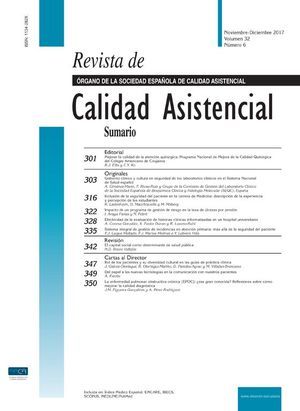This article summarises the document of the same name issued by the COVID-19 Advisory Commission of Spanish General Medical Council,1 and published on its webpage.2
The second wave of the COVID-19 pandemic confirms the deficiency of its control in Spain; and evidences its impact in the Spanish society, economy, and health. The wave is creating disappointment, damage, demoralisation and tension throughout the Spanish citizenship. The prestige and legitimacy that doctors and other health professionals’ held before the pandemia might be followed with some consequences on service of overcoming this deep and complex crisis that we are facing. A common strategy is required, and everyone must contribute to its achievement. However, there are several barriers that should be overwhelmed: knowledge gaps, imperfect institutional frameworks, a tense political climate, and an unstable and inconsistent social awareness and behaviour.
In the health system, this second wave has been appeared when consequences of previous one had not been mended yet: Primary Healthcare has been surpassed in many places due to community transmission; hospitals are also losing their capacity to treat non-COVID patients. Health staff have lost trust or motivation, and the health care system buckles. It is possible that the National Health System will not emerge unscathed from the pandemic, unless many things will be approach quickly, to change the current situation.
The strengthening of Public Health has been uneven and somewhat disheartening; the exit from confinement has plunged into a summer lethargy many necessary initiatives to the reinforcement of healthcare services. There is no reliable information on contact tracers’ activity the ability to trace transmission chains seems to be limited, although it differs between the Autonomous Communities.
The increased availability and types of diagnostic tests are good news; but not their frequent misuse to perform screening programmes for general population promoted by political authorities due to misinformation or image campaigns. Only the appropriate use of testing for SARS-CoV-2 based on prior clinical or public health judgement, they become effective instruments to combat COVID-19.
Non-COVID patients must not be in practice “de-prioritised”. It is necessary to include reinforcement measures in the strategies and contingency plans to address the delay that is going to accumulate in new patients, in the control and revision of chronic patients or in their follow up. And there is a need of measures to address the consequences and mental health problems that COVID-19 is leaving and will probably leave in many people.
The social conscience is disoriented and faint before the new phase of pandemic. Messages from public health arrive not adequately; political tension produces an adverse climate to generate trust and adherence in the population; the scientific world sometimes does not help with the premature creation of expectations with preliminary and immature research; and the media and social networks generally amplify the existing confusion and irritation and colour it with sensationalism and excess.
This situation invites and forces the medical profession to take a step forward in informing patients and citizens.
The medical profession must act on several levels.
- •
To promote a proper organisation in the pandemic combat: providing clear criteria to the authorities and promoting improvements in the legal framework that supports public health decisions.
- •
To insist on the importance of implementing those measures in which there is consensus, but not enough action: epidemiological surveillance (contact tracing included) and the strengthening of Primary Care are two clear sources of problems due to the omission of necessary changes.
- •
To send direct messages to the population, using the prestige and legitimacy capital of the medical profession to produce behavioural changes that facilitate the control of the pandemic, reduce health damage and lower the social cost. In addition, fighting the deniers’ approaches to COVID-19 and/or its effects, especially when they come from healthcare personnel.
To generate messages to the population, they must be technically grounded, science-based, conceived from a tolerant and open attitude, and seeking the coalition with other health professions to enhance the discourse.
Some elements such as the following should be incorporated into the contents: changing the dominant narrative to contribute to social cohesion (let no one be left behind); not leaving non-COVID-patients aside; giving a longer time perspective for the population to prepare for a long-distance race; advocating for financial support of businesses and families affected by the confinement and quarantine measures; explaining that the most effective and efficient way to control pandemics is through “social treatment” rather than the clinical approach, to give relevance to the individual contribution to protect themselves and others; conveying a realistic but positive message of the possibilities and limitations of science and technology; and disapproving sensationalism and the generation of false expectations.
This more direct approach from the Medical Colleges to patients and citizens should recruit the synchronised and harmonised action of their 52 Provincial organisations, and be projected to the media and social networks, with clear and repeated messages that help to change the vision and the attitude of the population and patients to COVID-19.
The COVID-19 Advisory Commission of Spanish General Medical Council was created in April 2020, and it is composed by these 40 members: Álvarez-Escudero J, Arroyo-Castillo MR, Azcutia-Gómez MR, Calvo-Rico R, Cantero-Martínez J, Casado-Buendía S, Castellón-Leal E, Cobo-Castro T, Córdoba-Romero A, Domínguez-Roldán JM, García-Ruiz A, Gómez-Huelgas R, González-Alonso J, González-López-Valcárcel B, Gual-Sala A, Hernández-Aguado I, Jiménez-Martínez JL, Jiménez-Ruiz CA, Laín-Terés N, Landa-García JI, Larios-Risco D, Lorenzo-Martínez S, Martín-Delgado MC, Martín-Zurro A, Mayol-Martínez J, Mendicutti-Sabater L, Molina-Cabildo J, Oliva-Moreno J, Peiró-Moreno S, Prieto-Menchero S, Repullo-Labrador JR, Rodríguez-Artalejo F, Rodríguez-Sendín JJ, Romero-Agüit s, Ruiz-Montero R, Segura-Benedicto A, Varela-Rodríguez C, Vázquez-Lima T, Vázquez-Mata G, Vilardell-Tarrés M. Experts’ affiliations available at: https://www.cgcom.es/comision_covid19/miembros-de-la-comisi%C3%B3n-asesora-covid-19-omc.
10th Report of the COVID-19 Commission of the Spanish Medical Association. 22/10/2020: https://www.cgcom.es/comision_covid19/informe-10-ca-covid-19-omc-sobre-la-profesi%C3%B3n-m%C3%A9dica-ante-la-reactivacion-de-la.







